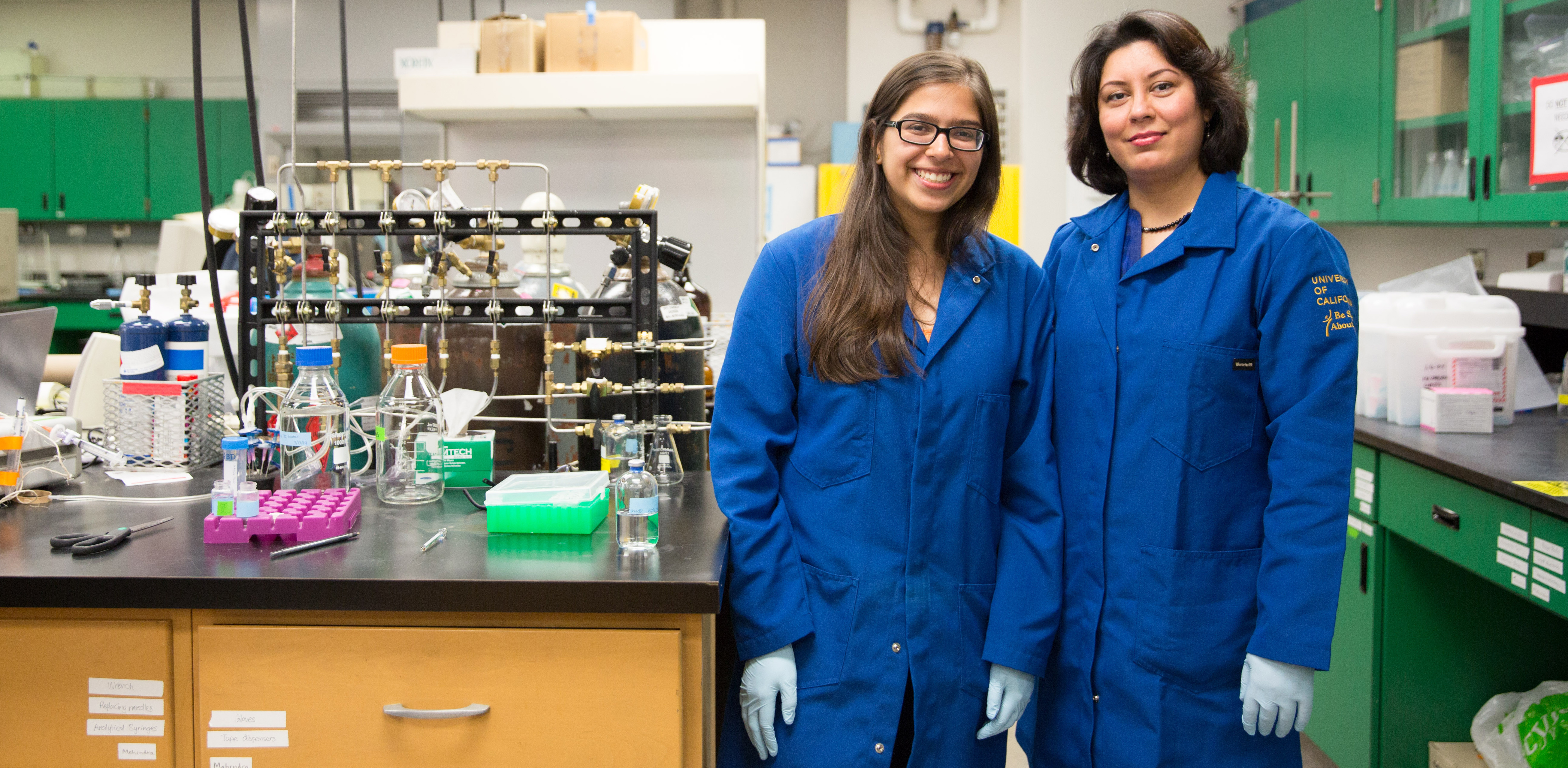
Doctoral Programs
Environmental Engineering Ph.D.
The field of Environmental Engineering, as partial preparation for the degree of Doctor of Philosophy in Civil Engineering, focuses on the understanding and management of physical, chemical, and biological processes in the environmental and in engineered systems. Fundamentals taught in this program enable students to identify important issues, evaluate available information, organize and implement original research, and apply the results of research toward the solution of environmental problems.
Minimum Undergraduate Preparation
The following courses, normally completed at the undergraduate level, are considered prerequisite material for this field of study. Students are responsible for the material covered in these courses.
Chem 11A/B/B/BL: General Chemistry & General Chemistry Laboratory
C&EE 150: Engineering Hydrology or C&EE 151: Introduction to Water Resources Engineering
C&EE 153: Introduction to Environmental Engineering Science
Math 33A: Matrices and Differential Equations
Math 33B: Infinite Series
MAE 103: Elementary Fluid Mechanics
MAE 105A: Introduction to Engineering Thermodynamics
Minor Fields
Students majoring in Environmental engineering will be expected to complete two minor fields, composed of three courses each (with at least two at the graduate level) or one minor field composed of five courses (with at least three at the graduate level). Note that these are the minimum requirements for completion of the minor field.
Minor fields may be either established or ad hoc. Established minor field programs (corresponding to established fields of study) must be approved by the appropriate field chair. If the department administering the minor field has requirements exceeding the minimum requirements stated above, the student will be expected to complete the requirements of that department.
Ad hoc minor field programs must consist of a coherent set of courses that do not overlap the Major Field Core or Elective courses. Courses taken to fulfill the minor field requirement will generally be chosen from those lsited below. These courses are listed to provide guidance for the students; other courses may be substituted subject to approval. Ad hoc minor field programs must be approved by two faculty representing the ad hoc minor field and the chair of the environmental Engineering PhD Field
Committee.
Minor Field Elective Courses
Civil & Environmental Engineering
C&EE 175: Introduction to Elements of Decision Making
C&EE 275: Multiattribute Decision Making with Conflicting Objects
C&EE 276: Perspectives of System Representation
C&EE 220: Shear Strength of Soil & Stability of Slopes
C&EE 221: Foundation Engineering
C&EE 222: Soil Dynamics
C&EE 250A: Surface Water Hydrology
C&EE 250B: Groundwater Hydrology
C&EE 250C: Mathematical Modeling of Contaminant Transport in Groundwater
C&EE 251: Water Resources Systems Engineering
C&EE 252: Engineering Economic analysis of Water & Environmental Planning
C&EE 260: Advanced Topics in Hydrology & Water Resources
C&EE M262A: Introduction to Atmospheric Chemistry
C&EE M262B: Atmospheric Diffusion & Air Pollution
Chemical Engineering
ChE 101C: Mass Transfer -or (not both)- MAE 105D: Transport Phenomena ChE 106: Chemical Reaction Engineering
ChE 210: Advanced Chemical Reaction Engineering
ChE 240: Fundamentals of Aerosol Technology
Computer Science
CS 270A: Computer Methodology: Advanced Numerical Methods
CS 271A: Modeling & Simulation of Lumped Parameter Systems
CS 271B: Modeling & Simulation of Distributed Parameter Systems
Electrical Engineering
EE 236A: Linear Programming
EE 236B: Nonlinear Programming
EE 236C: Optimization Methods for Large-Scale Systems
Environmental Health Sciences
EHS 225: Atmospheric Transport & Transformations of Airborne Chemicals
EHS 240: Environmental Toxicology
EHS 241: Environmental Toxicology: Trace Contaminants
EHS 252D: Properties & Measurement of Airborne Particles
EHS 255: Transport & Fate of Organic Contaminants in the Environment
EHS 262: Control of Airborne Contaminants in Industry
EHS 264: Environmental Microbiology
EHS 410: Instrumental Methods in Environmental Sciences
Mechanical & Aerospace Engineering
MAE 105D: Transport Phenomena -or (not both) ChE 101C: Mass Transfer
MAE 175: Applications of Probabilistic Risk Analysis
MAE 274: Methods of Probabilistic Risk Assessment
MAE 275: Methods for Risk Management
Minimum Preparation for Minor Field Students
Students wishing to minor in Environmental Engineering will be expected to complete
C&EE 254A, C&EE 255A, and C&EE 255B.
Students electing Environmental Engineering as a minor field will be given a written examination on their preparation. Minor field students will be exempted from this examination if they obtain a grade point average of at least 3.33 in their minor field courses.
Journals
Atmospheric Environment
Critical Reviews in Environmental Control
Environmental Science & Technology
Environmental Toxicology & Chemistry
Hazardous Waste & Hazardous Materials
Journal of Air & Waste Management Association
Journal American Water Words Association
Journal of Contaminant Hydrology
Journal of Environmental Engineering
ASCE Journal of Environmental Quality
Journal of Hydraulic Engineering
ASCE Water Environment Research (previously Journal of the Water Pollution Control Federation)
Water Research Water Resources Research
Texts
American Water Works Association, Water Quality Control & Treatment, McGraw Hill, 1990. (C&EE 255A)
Cussler, Diffusion-Mass Transfer in Fluid Systems, Cambridge Press, 1984. (C&EE265)
Flagan, F. and Seinfeld, J.H, Fundamentals of Air Pollution Engineerings, Prentice Hall, 1988. (C&EE163)
Freeze and Cherry, Groundwater, Prentice Hall, New Jersey, 1979. (C&EE 265)
Lapidus, L. and Pinder, G., Numerical Solutions of Partial Differential Equations in Science & Engineering, Wiley, New York 1982. (C&EE 253)
Metcalf & Eddy,Wastewater Engineering: Treatment, Disposal, & Reuse, ed., McGraw Hill, 1991 (C&EE 157B)
Montgomery Consulting Engineers, Water Treatment Principles & Design, Wiley-Interscience, 1985. (C&EE 157B)
Morel, F.M.M. and Hering, J.G., Principles & Applications of Aquatic Chemistry, Wiley-Interscience, 1993. (C&EE 254A, C&EE 254B)
Reynolds, T.D., Unit Operations & Processes in Environmental Engineering, Brooks/Cole, 1982. (C&EE 254C)
Stumm, W., Chemistry of the Solid-Water Interface, Wiley-Interscience, 1992. (C&EE 254C)
Wenta, C.A., Hazardous Waste Management, McGraw Hill, 1989, (C&EE 164)
